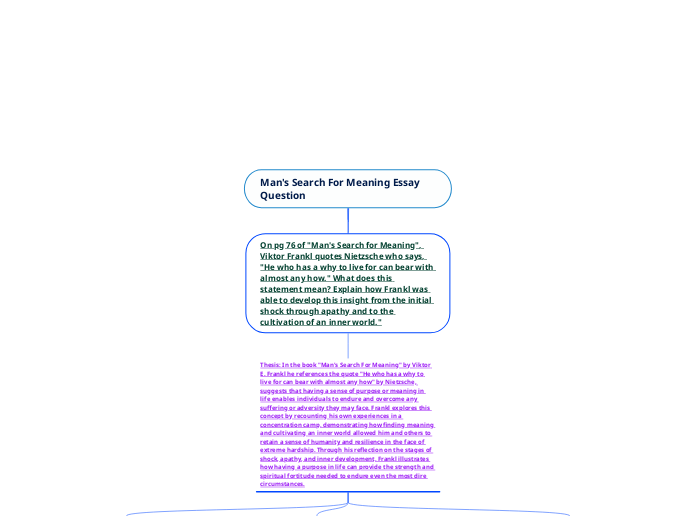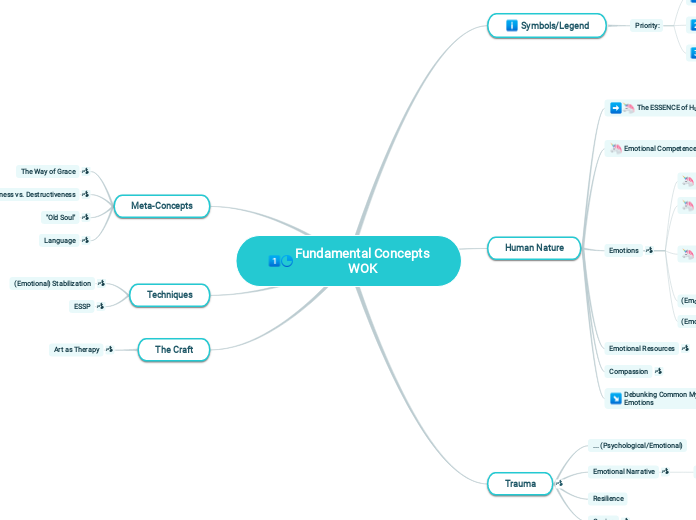Man's Search For Meaning Essay Question
On pg 76 of "Man's Search for Meaning", Viktor Frankl quotes Nietzsche who says, "He who has a why to live for can bear with almost any how." What does this statement mean? Explain how Frankl was able to develop this insight from the initial shock through apathy and to the cultivation of an inner world."
Thesis: In the book "Man's Search For Meaning" by Viktor E. Frankl he references the quote "He who has a why to live for can bear with almost any how" by Nietzsche, suggests that having a sense of purpose or meaning in life enables individuals to endure and overcome any suffering or adversity they may face. Frankl explores this concept by recounting his own experiences in a concentration camp, demonstrating how finding meaning and cultivating an inner world allowed him and others to retain a sense of humanity and resilience in the face of extreme hardship. Through his reflection on the stages of shock, apathy, and inner development, Frankl illustrates how having a purpose in life can provide the strength and spiritual fortitude needed to endure even the most dire circumstances.
Cultivation of an inner world
How did Frankl start to develop his insight regarding cultivation of inner life?
MP: Frankl found his purpose and meaning while being inside the concentration camp and even through all this pain and suffering he was going through he had made a deeper connection with himself and developed and new purpose and truly showed how much one can endure.
The second part of the second phase was the cultivation on an inner world that Frankl developed for himself, about finding his purpose and meaning through the most challenging circumstances.
"Life in a concentration camp tore open the human soul and exposed its depths. Is it surprising that in those depths we again found only human qualities which in their very nature were a mixture of good and evil? The rift dividing good from evil, which goes through all human beings, reaches into the lowest depths and becomes apparent even on the bottom of the abyss which is laid open by the concentration camp." (Frankl 87).
"We had literally lost the ability to feel pleased and had to relearn it slowly. Psychologically, what was happening to the liberated prisoners could be called "depersonalization." Everything appeared unreal, unlikely, as in a dream. We could not believe it was true." (Frankl 88).
"As the day of his liberation eventually came, when everything seemed to him like a beautiful dream, so also the day comes when all his camp experiences seem to him nothing but a nightmare" (Frankl 93).
Apathy
How does Frankl and the other prisoners respond in phase 2 of being in the camp?
MP: The prisoners went through apathy in a number of different way some of these consisted of confusion, sadness, pain and doubt.
The second phase that Frankl and the other prisoners went through was the apathy phase where they experienced many different emotions and numbness.
"I spent some time in a hut for typhus patients who ran very high temperatures and were often delirious, many of them moribund. After one of them had just died, I watched without any emotional upset the scene that followed, which was repeated over and over again with each death. One by one the prisoners approached the still warm body. One grabbed the remains of a messy meal of potatoes; another decided that the corpse's wooden shoes were an improvement on his own, and exchanged them. A third man did the same with the dead man's coat, and another was glad to be able to secure some--just imagine!--genuine string. (Frankl 27).
"not having news of our families, who had either been sent to another camp or gasses right away; that a normal workman was not threatened by death continuously, daily and hourly." (Frankl 28).
"In spite of all the enforced physical and mental primitiveness of the life in a concentration camp, it was possible for spiritual life to deepen. Sensitive people who were used to a rich intellectual life may have suffered much pain (they were often of a delicate constitution), but the damage of their inner selves was less. they were able to retreat from their terrible surroundings to a life of inner riches and spiritual freedom." (Frankl 36).
Subtopic
Initial Shock
What was the initial shock in the book and how did Frankl and the other prisoners respond?
MP: Shock was Frankl and the prisoners first emotion that they ran into due to the fact they were being sent to the worst concentration camp known to man, and they knew that everything that they had down and accomplished over their lives was about to be taken and stripped away from them.
Elaboration on Main Point
The initial shock in "Mans Search For Meaning" was that Frankl and the other prisoners went into this shock due to the fact they found out that they were being transported to Auschwitz, and Frankl and the other prisoners did not know how to respond they stuck in the shock phase at first and did not believe that what they were encountering was real
Quotes
"Then the train shunted, obviously nearing a main station. Suddenly a cry broke from the ranks of the anxious passengers, "There is a sign, Auschwitz!" Everyone's heart missed a beat at that moment. Auschwitz -- the very name stood for all that was horrible: gas chambers, crematoriums, massacres." (Frankl 9)
"The carriage doors were flung open and a small detachment of prisoners stormed inside. They wore striped uniforms, their heads were shaved, but they looked well fed." (Frankl 10).
Fifteen hundred captives were cooped up in a shed built to accommodate probably two hundred at the most. We were cold and hungry and there was not enough room for everyone to squat on the bare ground, let alone to lie down." (Frankl 11).









